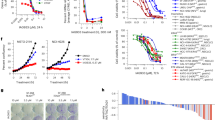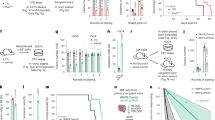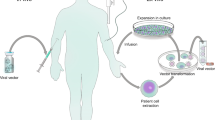Abstract
Gene therapy of cancer using adenovirus as a single treatment modality has met limited success and efforts to enhance therapeutic outcomes have included combination of gene therapy with chemotherapy. The goal of this study was to investigate which chemotherapeutic agents may be suitable for combination with gene therapy of prostate cancer. Using an adenovirus expressing green fluorescent protein (GFP), we determined the effect of cisplatin, gemcitabine, doxorubicin, depsipeptide and MS-275 on adenoviral infectivity and transgene expression in LNCaP cells. We found that the two histone deacetylase inhibitors (HDACi), depsipeptide and MS-275, and to a lesser extent doxorubicin, increased infectivity and transgene expression. However, only the HDACi selectively increased infectivity in LNCaP cells while doxorubicin increased infectivity to a greater extent in normal prostate epithelial cells (PrEC). The increase in infectivity but not transgene expression correlated to increased surface expression of coxsackie and adenovirus receptor (CAR). Increased transgene expression following infection with an adenovirus expressing tumor necrosis factor-related apoptosis inducing ligand (TRAIL) was observed only in LNCaP cells treated with depsipeptide or MS-275. Combination of TRAIL gene therapy with HDACi but not doxorubicin resulted in increased induction of apoptosis in LNCaP cells. In contrast, apoptosis was not enhanced by HDACi in normal PrEC. These results suggest that combination of HDACi with adenoviral TRAIL gene therapy may be a new therapeutic approach for the treatment of prostate cancer that warrants further investigation.
This is a preview of subscription content, access via your institution
Access options
Subscribe to this journal
Receive 12 print issues and online access
$259.00 per year
only $21.58 per issue
Buy this article
- Purchase on Springer Link
- Instant access to full article PDF
Prices may be subject to local taxes which are calculated during checkout







Similar content being viewed by others
References
Greber UF . Signalling in viral entry. Cell Mol Life Sci 2002; 59: 608–626.
Korn WM, Macal M, Christian C, Lacher MD, McMillan A, Rauen KA et al. Expression of the coxsackievirus- and adenovirus receptor in gastrointestinal cancer correlates with tumor differentiation. Cancer Gene Ther 2006; 13: 792–797.
Li Y, Pong RC, Bergelson JM, Hall MC, Sagalowsky AI, Tseng CP et al. Loss of adenoviral receptor expression in human bladder cancer cells: a potential impact on the efficacy of gene therapy. Cancer Res 1999; 59: 325–330.
Marsee DK, Vadysirisack DD, Morrison CD, Prasad ML, Eng C, Duh QY et al. Variable expression of coxsackie-adenovirus receptor in thyroid tumors: implications for adenoviral gene therapy. Thyroid 2005; 15: 977–987.
Matsumoto K, Shariat SF, Ayala GE, Rauen KA, Lerner SP . Loss of coxsackie and adenovirus receptor expression is associated with features of aggressive bladder cancer. Urology 2005; 66: 441–446.
Nemunaitis J, Swisher SG, Timmons T, Connors D, Mack M, Doerksen L et al. Adenovirus-mediated p53 gene transfer in sequence with cisplatin to tumors of patients with non-small-cell lung cancer. J Clin Oncol 2000; 18: 609–622.
Anderson WF . Gene therapy scores against cancer. Nat Med 2000; 6: 862–863.
Lamont JP, Nemunaitis J, Kuhn JA, Landers SA, McCarty TM . A prospective phase II trial of ONYX-015 adenovirus and chemotherapy in recurrent squamous cell carcinoma of the head and neck (the Baylor experience). Ann Surg Oncol 2000; 7: 588–592.
Jacob D, Davis JJ, Zhang L, Zhu H, Teraishi F, Fang B . Suppression of pancreatic tumor growth in the liver by systemic administration of the TRAIL gene driven by the hTERT promoter. Cancer Gene Ther 2005; 12: 109–115.
Kelley JR, Fraser MM, Hubbard JM, Watson DK, Cole DJ . CaSm antisense gene therapy: a novel approach for the treatment of pancreatic cancer. Anticancer Res 2003; 23: 2007–2013.
Triplett JW, Herring BP, Pavalko FM . Adenoviral transgene expression enhanced by cotreatment with etoposide in cultured cells. Biotechniques 2005; 39: 826, 828, 830, passim.
Sachs MD, Ramamurthy M, Poel H, Wickham TJ, Lamfers M, Gerritsen W et al. Histone deacetylase inhibitors upregulate expression of the coxsackie adenovirus receptor (CAR) preferentially in bladder cancer cells. Cancer Gene Ther 2004; 11: 477–486.
Pong RC, Lai YJ, Chen H, Okegawa T, Frenkel E, Sagalowsky A et al. Epigenetic regulation of coxsackie and adenovirus receptor (CAR) gene promoter in urogenital cancer cells. Cancer Res 2003; 63: 8680–8686.
El-Zawahry A, Lu P, White SJ, Voelkel-Johnson C . In vitro efficacy of AdTRAIL gene therapy of bladder cancer is enhanced by trichostatin A-mediated restoration of CAR expression and downregulation of cFLIP and Bcl-XL. Cancer Gene Ther 2006; 13: 281–289.
MacFarlane M . TRAIL-induced signalling and apoptosis. Toxicol Lett 2003; 139: 89–97.
Voelkel-Johnson C, King DL, Norris JS . Resistance of prostate cancer cells to soluble TNF-related apoptosis-inducing ligand (TRAIL/Apo2L) can be overcome by doxorubicin or adenoviral delivery of full-length TRAIL. Cancer Gene Ther 2002; 9: 164–172.
Piekarz R, Bates S . A review of depsipeptide and other histone deacetylase inhibitors in clinical trials. Curr Pharm Des 2004; 10: 2289–2298.
Rubinchik S, Ding R, Qiu AJ, Zhang F, Dong J . Adenoviral vector which delivers FasL-GFP fusion protein regulated by the tet-inducible expression system. Gene Ther 2000; 7: 875–885.
Earel Jr JK, VanOosten RL, Griffith TS . Histone deacetylase inhibitors modulate the sensitivity of tumor necrosis factor-related apoptosis-inducing ligand-resistant bladder tumor cells. Cancer Res 2006; 66: 499–507.
VanOosten RL, Moore JM, Karacay B, Griffith TS . Histone deacetylase inhibitors modulate renal cell carcinoma sensitivity to TRAIL/Apo-2L-induced apoptosis by enhancing TRAIL-R2 expression. Cancer Biol Ther 2005; 4: 1104–1112.
Goldsmith ME, Kitazono M, Fok P, Aikou T, Bates S, Fojo T . The histone deacetylase inhibitor FK228 preferentially enhances adenovirus transgene expression in malignant cells. Clin Cancer Res 2003; 9: 5394–5401.
Lacher MD, Tiirikainen MI, Saunier EF, Christian C, Anders M, Oft M et al. Transforming growth factor-beta receptor inhibition enhances adenoviral infectability of carcinoma cells via up-regulation of Coxsackie and Adenovirus Receptor in conjunction with reversal of epithelial-mesenchymal transition. Cancer Res 2006; 66: 1648–1657.
Okegawa T, Li Y, Pong RC, Bergelson JM, Zhou J, Hsieh JT . The dual impact of coxsackie and adenovirus receptor expression on human prostate cancer gene therapy. Cancer Res 2000; 60: 5031–5036.
Okegawa T, Pong RC, Li Y, Bergelson JM, Sagalowsky AI, Hsieh JT . The mechanism of the growth-inhibitory effect of coxsackie and adenovirus receptor (CAR) on human bladder cancer: a functional analysis of car protein structure. Cancer Res 2001; 61: 6592–6600.
Nakata S, Yoshida T, Horinaka M, Shiraishi T, Wakada M, Sakai T . Histone deacetylase inhibitors upregulate death receptor 5/TRAIL-R2 and sensitize apoptosis induced by TRAIL/APO2-L in human malignant tumor cells. Oncogene 2004; 23: 6261–6271.
Vanoosten RL, Moore JM, Ludwig AT, Griffith TS . Depsipeptide (FR901228) enhances the cytotoxic activity of TRAIL by redistributing TRAIL receptor to membrane lipid rafts. Mol Ther 2005; 11: 542–552.
Singh TR, Shankar S, Srivastava RK . HDAC inhibitors enhance the apoptosis-inducing potential of TRAIL in breast carcinoma. Oncogene 2005; 24: 4609–4623.
Zhang XD, Gillespie SK, Borrow JM, Hersey P . The histone deacetylase inhibitor suberic bishydroxamate: a potential sensitizer of melanoma to TNF-related apoptosis-inducing ligand (TRAIL) induced apoptosis. Biochem Pharmacol 2003; 66: 1537–1545.
Acknowledgements
This work was supported by a grant from the NIH/NCI CA102218.
Author information
Authors and Affiliations
Corresponding author
Rights and permissions
About this article
Cite this article
Kasman, L., Lu, P. & Voelkel-Johnson, C. The histone deacetylase inhibitors depsipeptide and MS-275, enhance TRAIL gene therapy of LNCaP prostate cancer cells without adverse effects in normal prostate epithelial cells. Cancer Gene Ther 14, 327–334 (2007). https://doi.org/10.1038/sj.cgt.7701017
Received:
Revised:
Accepted:
Published:
Issue Date:
DOI: https://doi.org/10.1038/sj.cgt.7701017
Keywords
This article is cited by
-
MiRNA regulation of TRAIL expression exerts selective cytotoxicity to prostate carcinoma cells
Molecular and Cellular Biochemistry (2014)



